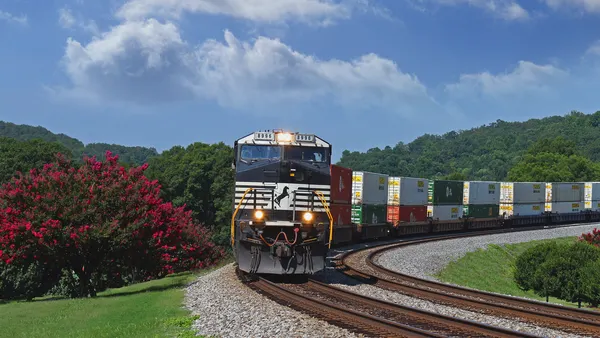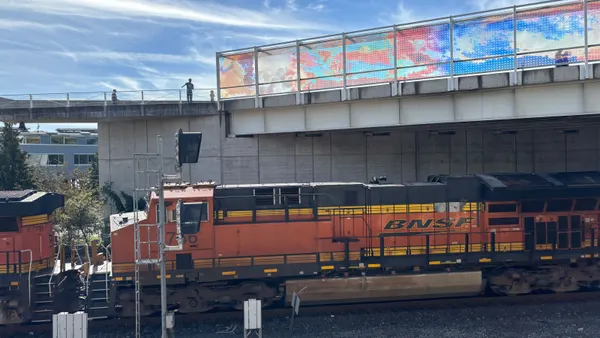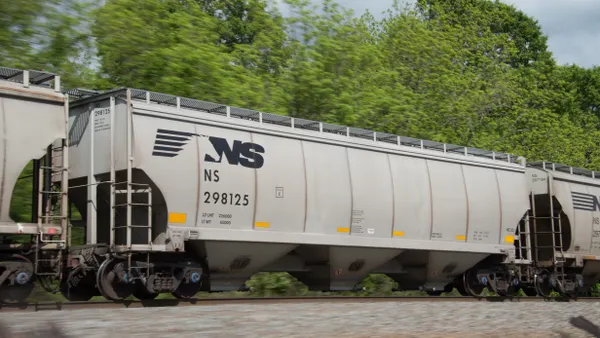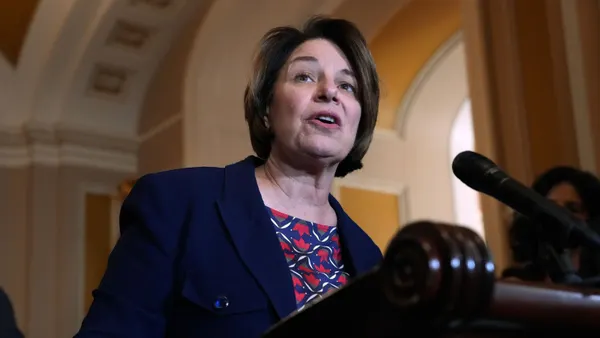Dive Brief:
- Kansas City Southern (KCS) reported a slight increase in overall freight volume year-over-year (0.17%), bolstered by its cross-border business. Though essentially flat, KCS is the first Class I not to report a downward volume trend in the third quarter so far. Cross-border freight volume grew 12% year-over-year for the quarter, but the railroad still expects overall volume to end the year flat or slightly down, executives shared on their third-quarter earnings call Friday.
- The railroad grew revenue by 7% year-over-year in the quarter, as PSR initiatives continue to add efficiency to operations. "Simply put, we handle more volume with less equipment, which helped us realize improvements in both revenue and costs. Again, a great case study for PSR," said Chief Marketing Officer Mike Naatz.
- The railroad's automotive volumes are in flux after the GM strike affected production at major shippers in Mexico. "Suffice to say that we are pleased to see that UAW and GM have reached a tentative labor agreement. So, we'll see how that plays out at the end of the month here," Naatz said.
Dive Insight:
KCS is exhibiting the effects of overall depressed volume for railroads less than other Class I's due to its substantial freight share that crosses the U.S.-Mexico border. Chemical and petroleum products and agricultural and mineral shipments both grew double digits in terms of carloads year-over-year.
In terms of volumes going forward, KCS executives strictly avoided making any statements regarding 2020 expectations, but PSR czar Sameh Fahmy expressed some optimism that the USMCA would come to the House of Representatives floor for a vote soon.
"We’re certainly hopeful and doing everything we can to nudge it in that positive direction to try to get it done by the end of the year,"Fahmy said.
The railroad credits its PSR-related efforts for growing profits ahead of volume, though its operating ratio was up from the same quarter last year, due to restructuring costs associated with PSR network shifts. According to CFO Mike Upchurch, without those costs, OR was down to 60.7% for the quarter.
Unlike CSX and Union Pacific's earnings callsearlier in the week, where analysts asked how much more PSR progress they can expect after rapid implementation and obvious gains, KCS communicated it has much more room for improvement. The railroad is still in the midst of a "white-boarding process" — evaluating yards for their efficiency and importance with an eye toward closing low performers.
"We're making great progress on that, but we aren't at the point where we really feel like we know what that's going to result in terms of service improvements, cost profile, et cetera. So let us finish that," said CEO Pat Ottensmeyer.
KCS is primarily focused on two PSR pillars: reducing switches and consolidating trains to reduce crew starts. Consolidating trains leads to longer trains, which makes switching more difficult in yards with short tracks, which is why the "white-boarding" process is essential not just for cost efficiency but for improved operations, Fahmy explained.
"We're continuing to try to build the network that can hold more freight," COO Brian Hancock explained. "And so, it's a little bit different white-boarding exercise because we really feel good about not only the cost side, but the revenue upside."














